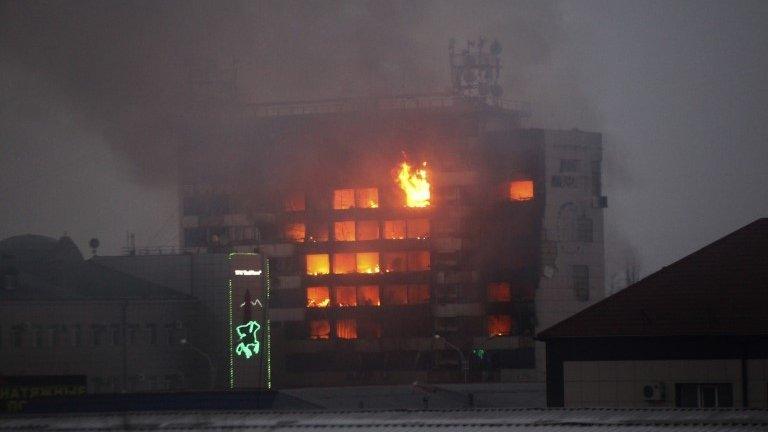Is Chechnya facing wave of jihadist violence?
- Published
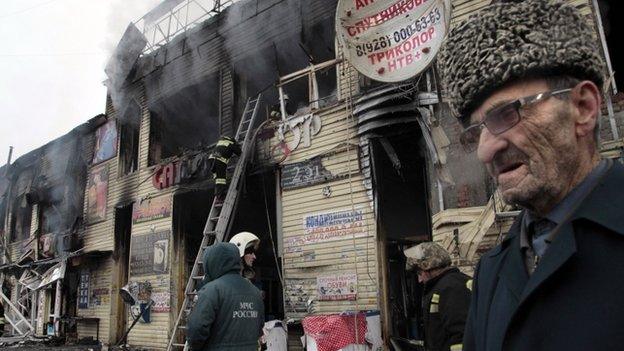
The scene of the recent gun battle in Grozny
Fears are growing that violence could be returning to the turbulent Russian republic of Chechnya after a period of relative calm and stability.
On the night of 4 December, police in the capital Grozny reportedly tried to stop a car or cars carrying alleged armed militants.
After a shootout, the militants took refuge in a publishing house building while others took over School no 20, also in Grozny.
In the ensuing battle, 11 militants were killed and up to 40 policemen were either killed or wounded.
Among the casualties was Umar Kadyrov, a close relative of the Chechen leader, Ramzan Kadyrov.
According to the Chechen authorities, the attack was organised by Akhmad Umarov, brother of the late leader of the militant Jihadist organisation, the so-called Caucasus Emirate, Doku Umarov.
Most of the militants were apparently young men from Urus-Martan, south of Grozny, which in the past was a hotspot of jihadist resistance.
An unverified video on the Kavkaz Center website claims that the operation was under the command of Aslan Byutukayev, known as Emir Khamzat, who is under an oath of allegiance to the new head of the Caucasus Emirate, Emir Abu Muhammad.
Ramzan Kadyrov said that Chechnya would demand Umarov's extradition from Turkey and announced on 5 December that family members of the militants would be expelled from Chechnya and their houses demolished.
Reports suggest that this policy has already been put into effect.
The attack occurred on the eve of Vladimir Putin's annual state of the nation address to the people of the Russian Federation, and was presumably intended to be a direct challenge to his and Kadyrov's policies of tough suppression of jihadist militancy in Chechnya.
Security measures
After a period of relative calm in recent years, this was the third major attack in Chechnya in 2014.
In April an infantry vehicle was blown up, killing several of the troops inside.
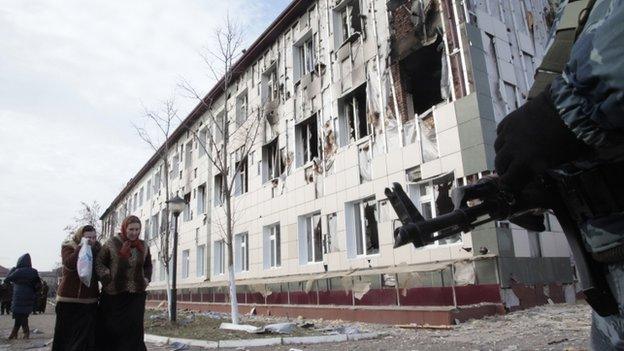
The shootout caused extensive damage
On 5 October, the Day of Grozny (and Ramzan Kadyrov's birthday), a suicide bomber blew himself up up in a concert hall where celebrations were under way, reportedly killing five police officers and wounding 13 other people.
The attacks belie Ramzan Kadyrov's claim that his heavy-handed security measures have put paid to Islamist militancy in the Chechen Republic, and raise the question of whether we are seeing the beginning of a new wave of jihadist militancy.
Seen through Western eyes, it might look as if we are. The threat seems familiar.
Disaffected youths are being recruited as jihadists, Chechen fighters are returning from the Middle East ready to internationalise jihad and make Chechnya and the Caucasus generally part of a larger Islamic Caliphate.
There are certainly links between the Caucasus Emirate and jihadist groupings fighting in Iraq and Syria.
There is also no doubt that Chechens - estimates of the number are as high as 2,000 - have been fighting for IS in Syria, as well as being a major presence in the al-Nusra Front.
An ethnic Chechen from Georgia, Abu Omar al-Shishani, is one of IS's most prominent commanders.
And a video released in August from a captured Syrian air base shows Russian-speaking fighters vowing to attack Russia and liberate Chechnya and the Caucasus.
Widespread corruption
But while the threat of jihadists returning to Chechnya and the Russian Federation more generally is a real one, which both Grozny and Moscow are very much aware of, there are significant differences between the situation in the Russian Federation and that of the UK and other Western nations.
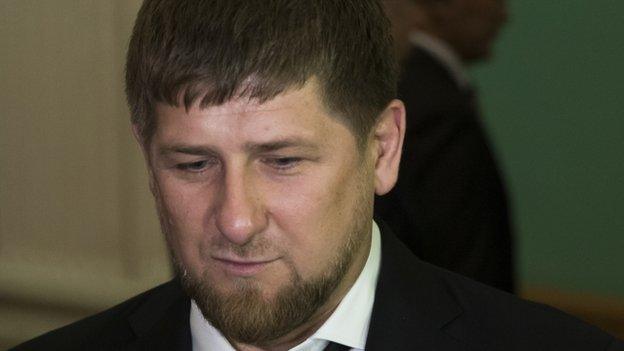
Chechen leader Ramzan Kadyrov lost a relative in December's gun battle
For one thing, the large majority of the Chechens now fighting in Syria and Iraq did not actually come from Chechnya itself.
Some are from the long-established Chechen enclave of Pankisi Gorge in Georgia, some are descendants of the Chechen diaspora which took refuge from the 19th century Russian conquest of the North Caucasus in Turkey and other countries of the former Ottoman Empire, while the majority are first-generation children of refugees from the second Chechen war (1999-2001) who settled in various European countries, notably Austria and France.
If they were to return whence they came to pursue jihad, it would most likely be these countries, rather than the Chechen Republic, that would be most at risk.
For another thing, notwithstanding widespread corruption and his regime's appalling human rights record, Ramzan Kadyrov has been notably successful in achieving stability and reconciliation in Chechnya since the second Russo-Chechen war.
He has done so in large part by carrying through an extensive official programme of supporting Islam, involving, for instance, state-funded building of mosques and madrassas, integration of Sharia into the existing legal system and promotion of Islamic dress code (especially for women) and dietary norms in the public sphere.
In other words, he is in some respects building an Islamic state within the secular Russian Federation.
A third and crucial consideration, in sharp contrast to the problems faced by the liberal democracies of the West, is that Kadyrov, with Moscow's blessing, has used and will continue to use brutal methods of control and repression to eliminate the jihadist threat within his republic.
Symbolic occasions
This has included his tactic of incorporating former Islamist opponents into his personal and much-feared guards - the Kadyrovtsy, external.
Taken together, these factors suggest that, however much Chechen jihadists want to "liberate" their homeland and make it part of a real - as opposed to the currently entirely virtual - Caucasus Emirate, there are much softer targets for them elsewhere.
We can expect, then, to see more attacks on Chechen territory in the future, but these are likely to be still limited in number, and generally attempted mainly on symbolic occasions, like the last two major incidents. (There is nothing new about this preoccupation with symbolic dates - Ramzan's father, Akhmad, the former president of Chechnya, was assassinated on 9 May, Russia's Victory Day).
Within Chechnya itself, what jihadists there still are there have been ideologically and physically marginalised to the extent that they are struggling to survive at all, let alone mount any concerted assault on the status quo.
And while it is truly alarming to imagine a large cohort of combat-hardened Chechen zealots looking for new arenas of jihad should their business in Syria and Iraq be finished - not currently an immediate prospect - Ramzan Kadyrov's Chechnya is likely to be a target that even they will find very difficult to hit strongly and often.
- Published10 December 2014
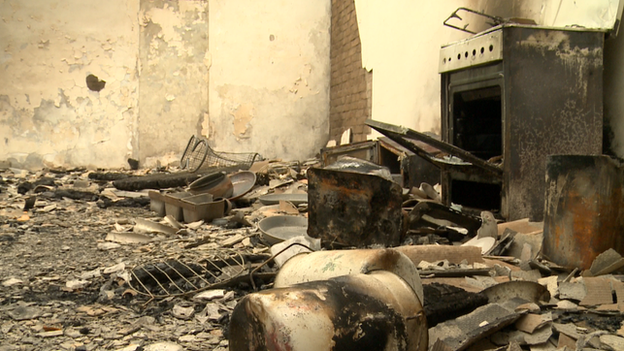
- Published4 December 2014
